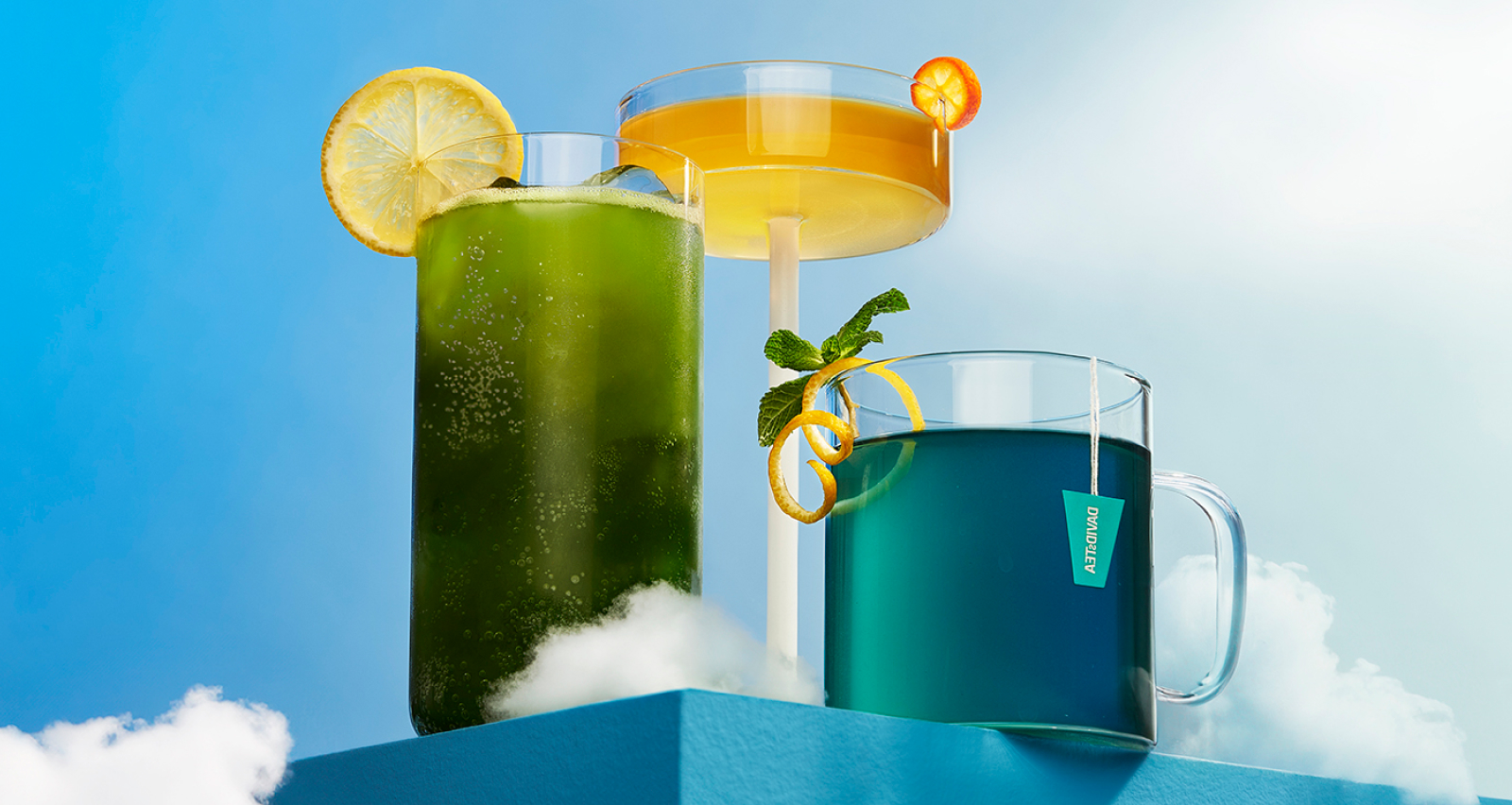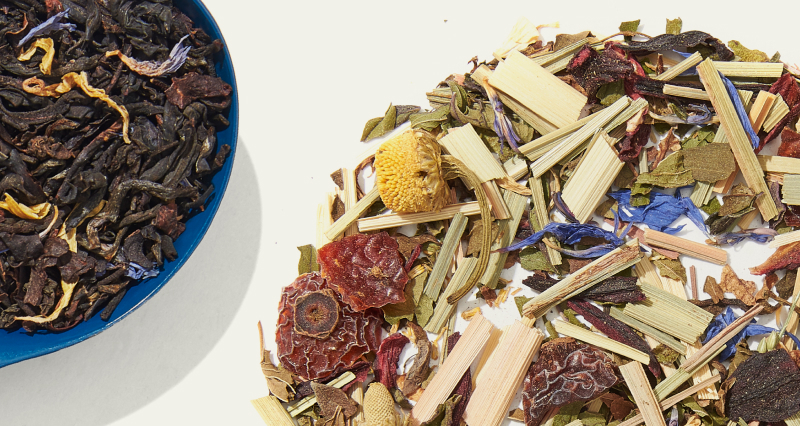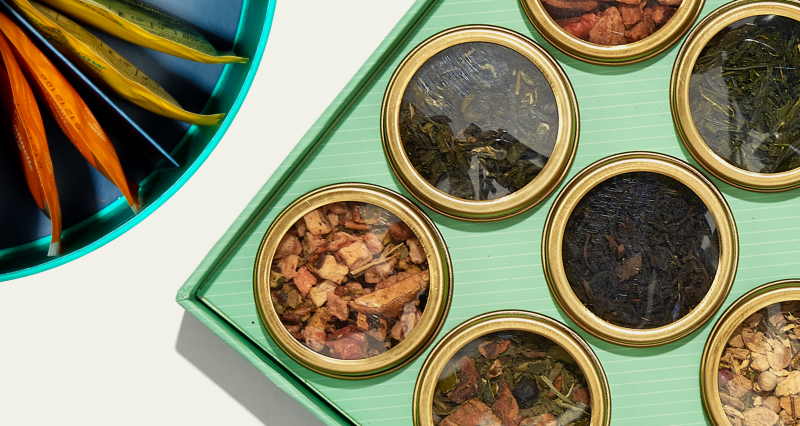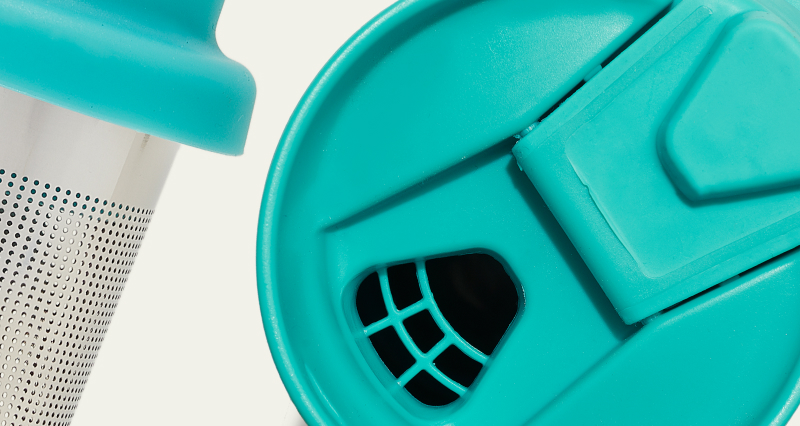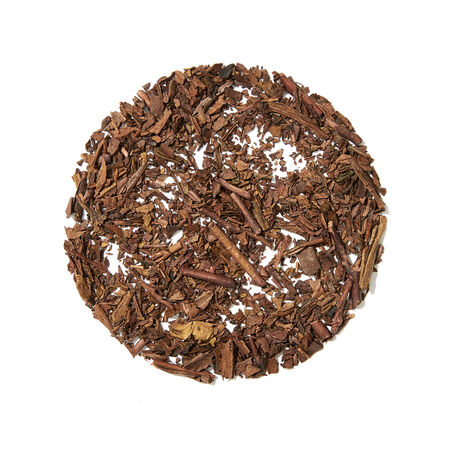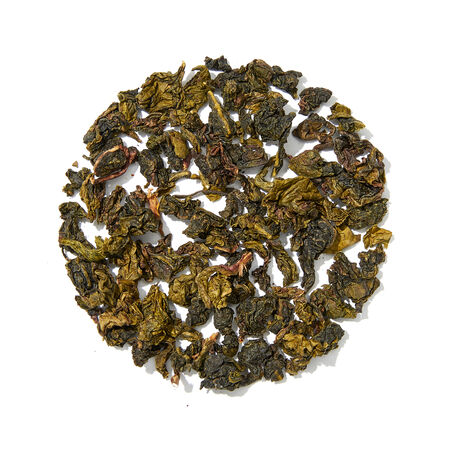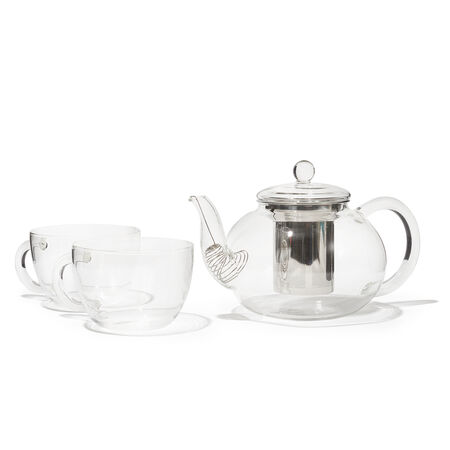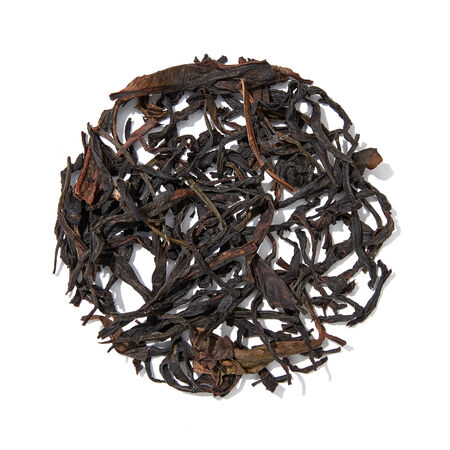episode 4
How do you
become a professional
tea taster?
with Ravi Pillai

steeping together
podcast - episode #04
How do you become a professional tea taster?
with Ravi Pillai
episode transcript
Marika de Vienne 0:19
Welcome everyone to another episode of Steeping Together, the podcast where we explore the vast world of tea over a cup of tea with tea enthusiasts. I'm your tea-obsessed host Marika and I am, as usual, terribly excited to be with you here all today. So the team here at DAVIDsTEA is filled with tea experts, enthusiasts, nerds, and we all come to the world of tea with our particular experience and expertise. But even amongst ourselves, there are certain individuals whose talents are so precise and so unmatched that they very often have the final say on whether tea is up to par or not. My guest today is one such person, a professional taster with over 30 years experience in the tea industry. Today, I want to talk about how one can train their palate, their senses, to truly taste every aspect that tea has to offer. So without further ado, I would like to welcome Ravi Pillai to today's conversation. Welcome, Ravi!
Ravi Pillai 1:19
Thank you, Marika, for inviting me. Do you make people anxious with your questions?
Marika de Vienne 1:24
I make people… I think I try to make everyone feel comfortable and welcome! I mean, certainly we're having this conversation over a cup of tea so you want everyone to feel relaxed. But I think due to my overexuberant personality, sometimes I make people a little bit anxious!
Ravi Pillai 1:45
Oh yeah, I'm sure looking forward to this, Marika.
Marika de Vienne 1:50
Ravi, would you like to introduce yourself the way you'd like to be introduced?
Ravi Pillai 1:54
Wow, you're starting off by testing my nerves.
Marika de Vienne 1:58
I didn’t mean to!
Ravi Pillai 1:59
Okay. So here are DAVIDs I'm the Manager of Tea Quality, Straight Teas, and Sachet Development, which really entails all attributes from organoleptic, and ingredient profile consistency of tea. From the time it gets selected to as much as it lives in our collection. I'm also instrumental in supporting our team in sourcing and enhancing our straight assortment. And I'm also influential in the development of various formats, such as ingredient reformulations for sachet formats, and preparation of beverage formulations. So that rounds up what I manage at DAVIDsTEA. Within the industry, it has been a different journey. And a very exciting exploration for me. I've contributed to many diverse aspects of tea from managing tea plantations for many years, then moving to international trading and marketing, buying teas from auction and other origins, developing custom blends for international and domestic markets. I was in Turkey for a few years as a consultant sourcing teas and developing standards for a brand. I've also adjudicated in many tea competitions in Canada and in the US over the last many years. So that's pretty much a self introduction.
Marika de Vienne 3:45
That was the most comprehensive self introduction, I think we've had to date, and I think it speaks to just how – I have no other way to say it, Ravi, you're a heavy dude! Like you are really –
Ravi: It’s a compliment – thank you.
Marika: It really is. I mean it with the with the highest order of respect, highest order of respect, because you have been in the tea industry for so long, but you've touched so many different aspects of it. And there were literally eight things you said in your self introduction that I think are deserving of their own episodes. I mean, you just threw Turkey in there and I was like, wait a sec I have to ask him about that after we finished recording. But I want to start with the beginning about what you do at DAVIDsTEA because I think we're going to dedicate an entire other episode to your pre-DAVIDsTEA life. I want to hear about the auctions. I want to hear about like I said Turkey, about the plant, running of the plantations. I mean, you've been out there, you've seen it. A word you dropped about part of your job description here was the ortho-[mumbles]? I don't know how to say that word.
Ravi: Organoleptics.
Marika: Organoleptics! Can you tell me what that means? Because I apparently can't even pronounce it. So I certainly don't know what it means.
Ravi Pillai 5:11
It actually means you're putting on a census together to evaluate the best out of a tea. It's detections, it’s flavour profiles, nuances. So all that comes together from a combination of your senses. And that's the organoleptic senses, your palate, your olfactory, the touch field, which I'll be talking as we go on more. So these are some of the things that you look for in a tea, what you use your senses to find in a tea. Or to evaluate a tea, which I would use.
Marika de Vienne 5:51
You're using all of your senses at your disposal to correctly evaluate the tea.
Ravi: Yes
Marika: So Ravi, in the three years that we've worked together, it's happened on occasion that I've just brought you a random cup of tea. And I say, I'm not sure what this is. I'm not entirely certain how it got brewed, help me out because for whatever project I'm working on, I need to know what this tea is. And I don't think it's witchcraft, but you seem to know, within one or two sips, not only which tea it is but how it was brewed. And where it's from. It's an absolute talent and a skill I know that you've developed over your many, many years. But to normal people like me, it seems quite magical. How do you always know what's brewing? – Is my first question for you.
Ravi Pillai 6:48
This happens quite so often. This has all to do with the experience and acquaintance over the teas. With a particular brand, or flavour profile of a tea, you tend to develop familiarity. So when a tea is steeping, you can pick up nuances, and sometimes attributes as well. Interestingly, I like to share another similar story. Some years back, it was in our own warehouse, we have some cartons were being opened, and the label was illegible or obscured. And they came to me requesting my assistance to identify the product. On approaching the area I mentioned the name of the tea from just the aroma. And sure enough, it was spot on.
Marika de Vienne 7:46
Wait, sorry, you walked into the area where the tea was being contained, where the tea was being kept? And based on the aroma in the air,
Ravi Pillai 7:57
While walking towards it…
Marika de Vienne 8:00
And while walking towards it, you were able to determine which tea this was? Please continue.
Ravi Pillai 8:08
Yes, so these are like I said, these are definitely through experience. And as I mentioned, the acquaintance you make over the tea. So it develops a familiarity with that profile, or with that tea. And that's what brings you this experience of being able to say something, so the attributes towards whether it's brewing, how it's being brewed, to pick up these nuances.
Marika de Vienne 8:38
So it's just, it’s experience. So, okay, how do you start tasting tea on a professional level? I want to learn, I want you to be my guide. So how can I start tasting tea professionally?
Ravi Pillai 8:56
Well that can be taken completely at a different level of education. Maybe we might not have enough even time to expand on that. But I can confirm merits to the skills developed over 35 years. And I must also owe this to my former bosses, who are likewise excellent tea testers. And it is their insistence in the beginning years of my career that has actually paid off dividends. As a youngster, I remember tasting on a daily routine the raw product, before and after oxidation.
Marika de Vienne 9:47
I'm sorry, I'm going to pause right there. You mean the tea leaves before they've been dried or oxidized? You would taste the raw leaf?
Ravi Pillai 9:56
Exactly, absolutely. Not after, not at harvest, but normally withered and sent through the roller when it comes out as a first dhool [batch] before you set it on the oxidation table. During the process, so it was at the raw stage, before oxidation, after oxidation, unsorted fire teas in bulk, sorted teas, invoiced teas, and similarly, comparison teas from different gardens and manufacturing facilities. I was also privileged enough to taste teas of different regions, altitudes, origins and actually trained my palate on diverse obligations. Tasting is not of just slurping and loving the tea. Evaluating a tea is based on a requirement, and your palate and mind should gear to that need. Be it detection, comparison, complementing, valuing, and even for blending purposes, maybe each having its own criteria. So your palate adapts to the environment provided. Let me put it in a different perspective: Your palate develops while you're growing. As a child, your palate is in a state of exploration, you're exploring. Then during adolescence, you tend to be selective, you have preferences, and when you move on to adulthood, your palate is more specialised or sophisticated. So these abilities are combined with the thought process, or the brain signals, where the brain controls your focus, the skill is cultivated on passion. And that comes from the heart. So this combination needs constant practice, just to enrich your potential and the competence.
Marika de Vienne 12:18
You know, I wasn't joking when I said you were a heavy dude. Let me just sum up, let me try to sum up what you just said because I think it's really important that you tasted the tea at several different stages, which is not something that everybody has access to. You know, post-withering pre-oxidation, post-oxidation, teas that as you said had been invoiced, which means they were specifically ordered for a specific purpose.
Ravi Pillai 12:44
Produced for a purpose, and after sorting they go into lots, or invoiced lots. So a certain grade would be invoice number this which has 1000 kilos and on the same thing might be another 600 kilos and an apron invoice. So each invoice can be a different grade and the same grade in different invoices.
Marika de Vienne 13:04
And those invoices are responding to a particular need from a customer to have a tea be a certain flavour or have a certain profile.
Ravi Pillai 13:14
Profile, could be, or just as it comes as produced, and into being graded or sorted.
Marika de Vienne 13:20
Okay, so the levels, I mean we could spend another episode – now we're doing three episodes with Ravi! We could spend another episode really analyzing like, from leaf to customer. You tasted these teas at all of their potential stop stages, right? So that's one way to do it and it speaks to your unique perspective. And you did this in countries like Sri Lanka and…
Ravi Pillai 13:48
Taiwan, India, Hong Kong, Turkey.
Marika de Vienne 13:52
My mind is blown, but I'm going to keep going, I'm going to keep going. So not everyone has the immense opportunity that you had to taste all of these things. But one thing that you said that I found very, very interesting was you were also tasting teas that came from different altitudes, and you'd have like different steeping. And that is something that we do have access to, at least in North America, is we can purchase teas from different altitudes, we can play with steeping times. And that is one way that you can begin to be able to distinguish the minute and very differences and distinctions of flavour that are apparent tea to tea. And the other thing that you said, the last thing that you said that I find to be absolutely true, is passion. Literally none of this would have happened without a daily devotion to tea.
Ravi Pillai 14:51
Definitely. Absolutely.
Marika de Vienne 14:54
I've never used one, I've seen them for sale, you know like tea journals? Like you can have a tea journal basically, well you write down what tea you had, what you tasted. Almost like, there's wine journals, you know? And there's all kinds. Is that a practice that you would recommend to people who are starting out? Because I feel like your experience has led you to understand that once you taste something, it's not necessarily just about enjoying it, but you're also kind of recording it for future reference, right?
Ravi Pillai 15:31
Partly, yes. It's more of education you give yourself. So when I say education, it's like in your college you're studying something as an education, so you keep that in mind. So this stays in your mind the more you taste it, so the more you taste it you're getting the familiarization on that. So that's what holds it in your mind. For reference, right? Yes to your point of journals, of books, that's reading knowledge, literature, to be well-read about teas, origins, does not make you a tea taster, a book knowledge. But definitely just give you the reading, education that you need, literature.
Marika de Vienne 16:22
Right, because I feel like it's still something that comes back to passion. It's still something that you have to feel. The knowledge is there. The experience is vital, especially in the position that you hold, but it kind of always comes down to the passion, the motivation, and the ability to feel it within you, really feel it within you. No, you said it I just repeated it! So is it only your tongue that needs to be developed? Because we think of tasting and we think okay, my tongue, I have to work on my palate. So is that the only tool that you need to develop in order to become, you know, a professional taster?
Ravi Pillai 17:09
I shouldn't be saying no to this. But I don't know how else to say it – but not really. Tasting revolves around all five senses, directly and indirectly. Initially, you must be of sound mind when you set up on tasting and that is key.
Marika de Vienne 17:34
What do you mean by sound mind? Because I feel like I'm almost never of sound mind. So what do you mean by that?
Ravi Pillai 17:42
Many things. Observant, focused, calm. Calm is a key word. Non-irritated, non-disturbed. And that should be a mind when you set upon yourself to taste teas.
Marika de Vienne 17:59
I feel like that's also the mindset I have before I start meditating.
Ravi Pillai 18:03
I was about to say that word, it’s like meditating.
Marika de Vienne 18:04
Really? Yeah, you described it, it feels like meditation to me.
Ravi Pillai 18:09
As much as that. Now, to the five senses, simply put here: see, feel, smell, taste. To have a quiet surround is critical. You need to be focused, as I said, so noise, voice, clutter, you must get rid of this. Then seeing the clarity of the cup, the infusions, all these support the cause. The sense of feel, comes from temperatures, either on your lips or the touch of the bowl. And then finally, smell and taste is when the olfactory takes over to determine the verdict. So this is where all senses plane to taste. So that's where I mentioned, it's not really developing the tongue, right? It automatically develops the tongue.
Marika de Vienne 19:09
So it's all of these different sensory inputs that you're taking your – so you've already put yourself in the mindset of calm and sereneness for you know, shortening it, then you have to look at the cup, look at the colour of the infusion, you'll feel the temperature first with your hand if you're holding a cup or as soon as it hits your tongue. It all supports the cause of informing your tongue, informing your palate, about the full potential of this tea.
Ravi Pillai 19:38
And that's also different of tasting a tea and enjoying a tea.
Marika de Vienne 19:43
Oh, yeah. Those are two different things. Are you using all of those skills for both?
Ravi Pillai 19:50
Yes, so the same senses, but your focus is different in your tasting tea and enjoying a tea. So I just mentioned the senses, how they work. When are focused on what you're tasting, that's when you need to be calm, you should not have noise or disturbance. Perhaps when you're enjoying a tea you don't need to be calm, you don't need to have a noiseless area. But the touch whether it’s tasting, whether it's enjoying, it starts with the touch, the warmth. When you take it up to your mouth, it enters your olfactory, your nostrils, the fumes, the aroma. That's where it starts, even before it gets into your tongue. And finally when you sip it, and it rolls amongst your tongue, the sensory buds on your tongue, that's when you're enjoying the experience. So that’s different to tasting. So you use the senses, but in two different focuses.
Marika de Vienne 20:46
Wow, all I keep thinking about is all the times I've been tasting with you. And because I love to talk so much, Ravi, sometimes you've looked at me and you said very gently, “Marika, we need to be quiet.” And I thought- I felt like I was back in school. You know, I always felt like when the teachers telling me to be quiet, I'm talking too much, you know? But I took your word for it. I never really questioned it because you're not somebody who imposes himself on people. So if you do say something like that, it's something to be taken seriously, because there would be no other reason for you to say that. But I think that this is the first time I've had you explain it to me from A to Z. And now I just feel tremendous guilt about all the times I've just run into the lab with a funny story!
Ravi Pillai 21:36
No you don’t need to be. Because not many people really understand the criteria of what you need to taste.
Marika de Vienne 21:43
Well, I think it's wonderful as well because what you're proposing is, if you want to taste tea on a professional level, you're also giving yourself a gift. You're giving yourself the gift of a form of meditation, of a time out, of a moment of calm, and you're doing it through a very ancient art form. I mean, the art of making tea is an ancient one. But I think in our modern lives that are just so hectic, and we're always on call, and there's always a zoom, and there's always a tweet, and there's always a text. And there's always…
Ravi Pillai 22:21
So much, so much that goes on.
Marika de Vienne 22:25
So much! I mean, I feel really called to now, and I've been tasting tea for 20 years, but I haven't been tasting it in the same vein as you have. I've been tasting it for pleasure. I've been tasting it to share with others. I'm more of the tea party person and less of the tea ceremony person. And now I want to start to use, genuinely start to use what you've just expanded on, not only to become a better taster, but I think to give myself permission to stop and really enjoy the beverage.
Ravi Pillai 23:03
Tea is to enjoy! Tea is to enjoy, it’s just that me, or I would say we, are a part of the part of the denomination to make that happen. So we’re on this side of the table making that in enjoyment happen.
Marika de Vienne 23:21
We get to bring these teas to a larger audience. Yeah. Well, I mean, thank you. Thank you for that, I mean it’s a lot of food for thought. I have two last questions for you. You've tasted hundreds of thousands of cups of tea. Quite literally, this is not hyperbole, this is not exaggeration. This is hundreds of thousands of cups of tea. Ravi, what's the best tea you've ever had?
Ravi Pillai 23:47
Now this is more nostalgic. Though I'm quite a purist with no additives, my best tea was what my mum made for me as a kid. And that was a tea always with milk and sugar. I always, always looked forward to that tea. I still once in a while indulge in this tea. Sometimes when my wife prepares a pot of tea for the family. But not always, I cannot handle the sugar limits in my tea. But it definitely takes me back to that, and I look forward and I’m in there enjoying a tea, I pour myself a cup and I drink, you know, one of those, my thoughts go back to that. That's my best tea.
Marika de Vienne 24:44
I love that answer for so many reasons, but it kind of comes back to you know, how you have so much technical experience and how you've had so many different cups of tea and you've been exposed to so so much, but it comes back to that feeling doesn't it? It always comes back to that feeling.
Ravi Pillai 24:59
Yes, my mom was a person who drank so many cups of tea a day. And I was part of her drinking. Every time she drank, I drank. And I always, I think that's what led me to the tea industry. Because I was so much in tea, I wanted tea. I drank more in the weekends, because on school days, I drink coffee in the morning and probably come back for one in the evening. But weekends, I'm all the time drinking tea with her. And that's what really led me to it. But over the years, when I went into tea plantations, I avoided the milk and the sugars, you know? And now I don't drink any milk and sugar other than that one cup.
Marika de Vienne 25:34
That one cup, that one memory to hold on to. I love that, that's just so wonderful. So Ravi, you’ve been in the tea industry forever. This is well established. You've tasted everything. What does tea mean to you?
Ravi Pillai 25:46
Tea means: Morning, noon, and night. And, anything in between.
Marika de Vienne 25:54
Brunch, second lunch, late night snack?
Ravi Pillai 25:57
Yes, I don't know what more to say, but other than that, it's to me it's everything. It has been that way for so many years, I've done only tea soon one out of college, and that's what I've been looking always within my life.
Marika de Vienne 26:13
It you know, it gives me a lot of hope. Because, you know, I think a lot of people – I'm sure you've been asked this a lot, “How do I start in the tea industry?” You know, it's not a codified industry in North America, at least, you know. In Asia and other countries, yes it is, there's a definite career path there. There are opportunities to grow. And I get that question a lot and I'm sure you do, too. How do I get into the tea industry, especially in North America, where it's essentially a business and not much else sometimes? There's no university of tea. And speaking to you today, it affirms my belief that the best way to get into the tea industry is to love it. You need to love it.
Ravi Pillai 26:57
You need to. Yes, definitely. Absolutely.
Marika de Vienne 27:01
Wow, this is great. I almost interrupted you several times during this interview, because Ravi, I asked you to make me a cup of tea for this conversation. And everyone else so far has either brought in a tea pot with little tasting cups, and it's been you know, it's been lovely. These have been great choices, great conversations, great teas. You came in with a tiny Gongfu teapot…
Ravi Pillai 27:30
That's how I drink my teas most of the time.
Marika de Vienne 27:33
And then you proceeded to pour it out into a cup, into cups, that make me regret not having this as a YouTube video because I think I'll be able to describe it, but it's a pouring style I've seen many many times before, be it in Taiwan or China. You have packed this very tiny teapot, a teapot that I can hold in the palm of my hand, with I want to say just based on across the table looking at it, about eight grams maybe?
Ravi Pillai 28:07
Perhaps, maybe, I do not weigh my teas. Generally I do it by experience. I take it down into my palm, and depends on – I know that there are certain standards where we say two grams, four grams. I really monitor my waters. And steep times I want to play it. I do not, in my process, I don't know if I should be saying this, but really I do not really time my teas or whatever, then I just take it in the palm and know how much I'm putting in there depending on the leaf style, and from where are the teas’ origins, and the make of the tea. That's how I measure my tea. And the waters I would also measure according to that, the temperature I would steep the teas in different temperatures according to leaf styles. More than even tea types.
Marika de Vienne 29:01
Whether it’s rolled a certain way.
Ravi Pillai 29:03
Exactly. And I steep it even the timings all is different to how I do it. So that's why this pot, with hot water and I just steeped it.
Marika de Vienne 29:12
I feel like, you know, I'm trying to explain just how you were steeping it and then you tell me all this. You're just a dropper of truth bombs Ravi, because another thing you just dropped is that yes, there are recipes, there are suggestions of this grammage to this steeping time to this water temperature to this steeping vessel, yes. But you, again, you steeped it through feel. You know your product, you know how to make your product, and you you looked at it, you weighed it with the palm of your hand, you know your water temperature, you know what you want to evoke. And then you poured it in such a beautiful seamless manner. And then you handed me the cup, and you know what I tasted Ravi? I tasted you. And that's what I love about tea.
Ravi: I love the way you put it.
Marika: I tasted Ravi in this cup. There is a – I don't know how to put it. It's just it's when somebody loves something. Look, I grew up, my father is a chef, and I can taste my father's love and passion when he cooks for the family in whatever he makes. And it's an intangible feeling, but it is there nonetheless. Exactly. And when you poured this for me, I tasted Ravi and it was perfect but it was gentle, and it had nuance, and it had gravitas, and I am deserving of this cup of tea because –
Ravi Pillai 30:38
I’m so glad you enjoy it.
Marika de Vienne 30:40
Thank you. What am I drinking? I don't even know what I’m drinking!
Ravi Pillai 30:43
This is a tea from Taiwan. It's the Oriental Beauty from Taiwan. It's a very limited edition tea. I don't even think that you get much for commercial purpose, it's just mostly circulated within Taiwan. From the northern part of Taiwan, from the mountain district.
Marika de Vienne 31:00
This is the tea that is purposefully allowed to be bitten by bugs, correct?
Ravi Pillai 31:06
Exactly. Not bugs, but you know, it's a grasshopper.
Marika: Oh, I didn't know that.
Ravi: Yeah, it's a hopper. It's not just bugs, it's a grasshopper. And the tea itself, the leaf itself has its self-immunity, it brings out the enzymes for protection. That's the flavour profiles that you get in it.
Marika de Vienne 31:29
Yeah, so the bite marks of these grasshoppers allows the leaves to…
Ravi Pillai 31:36
Not the bite marks, when the grasshopper attacks, the leaf itself naturally releases these enzymes as a protection. As a defence, a defence mechanism.
Marika de Vienne 31:50
And it’s those enzymes that we're tasting.
Ravi Pillai 31:53
Exactly. And it's also the time of harvest. And this tea is harvested and produced only in the month of May. So that's like a spring, you know, coming out of the cold period and going into the warmer climates.
Marika de Vienne 32:07
Okay, well, you know what, we're going to take a break, we're going to enjoy this, I'm going to get to ask Ravi a bunch of questions that we're not going to air because that is the privilege of working with Ravi Pillai and I'm going to take it! We'll be right back.
AD BREAK 32:22
Today's episode of Steeping Together is brought to you by Magnolia Oolong. With the gently soothing floral flavours of magnolia and jasmine, our expertly hand-scented oolong will leave you feeling as if you've just spent the day frolicking amongst the fresh spring flowers. Ragweed allergies not included. Magnolia Oolong. It's not just for your grandmother, but she'd probably love it too. Like, seriously. When's the last time you even visited or gave her a call? Magnolia Oolong… call your grandma!
Marika de Vienne 32:57
All right. Welcome back. It's time to play “What Are You Drinking?” The quiz where we ask our guests three situational questions, some realistic, some completely out there, and they have to use all of their experience and expertise to tell us what they would drink in any one of these given situations. Ravi, are you ready to play “What Are You Drinking?”
Ravi Pillai 33:17
I trust so.
Marika de Vienne 33:19
Well, you've had a great answer for everything so far so I can't imagine that will be far off the mark here!
Ravi Pillai 33:24
Let's go.
Marika de Vienne 33:26
Question one: Ravi, it's the weekend and miraculously you've woken up a couple of hours before your alarm feeling fully rested. The sun is just starting to rise, it's totally calm, quiet, and for these two hours you have no obligations. What are you drinking?
Ravi Pillai 33:48
Believe it or not, I walk to my closet. I’ll pull every tea at that moment to look for whatever shou pu’erh that I can find. Cooked pu’erh. And that's what I enjoy in the mornings. A pu’erh, a black tea, an aged ooong. Something that gives me strength and body in my palate. So I always look for the pu’erhs, sometimes I have very clean pu’erhs, which I really don't like I want a robust pu’erh. So that's where I'll go and I wake up, sunlight, and go to my closet and try to get a pu’erh and give me that kick.
Marika de Vienne 34:33
So shou pu’erh, a black tea, or an aged oolong. The word that that evokes, the thread that I see through the three of those teas is vigour. You're looking for vigour when you have this time for yourself in the morning to start your day. Why do I get the impression that you are not the type of man who's going to waste a day? Because if somebody had asked me that question, I would have been like “I'm gonna make a latte and then I'm gonna put like maple syrup because I need to treat myself!” You know?!
Ravi Pillai 35:07
Not many people get me when I say, even when I go to the closet and I'm pulling for teas. I like offer my wife a tea and when I say pu’erh. She loves pu’erh teas but not in the mornings. But that's what I go for.
Marika de Vienne 35:22
Right, that's what you go for. Yeah, I'm more of an afternoon drinker when it comes to my shou pu’erhs. I'll do a sheng occasionally in the morning. But they generally have to be, usually it's in the afternoon, but yeah I see that vigour. I see that seizing the day, I see that need to be awakened and awakening your senses to what's about to come to you. Well, you're just better than me, Ravi, I don't know how else to put it. Okay, are you ready for the second question? The family is getting ready for a Saturday at the beach. You cannot wait to swim, make sandcastles, soak up the sun. What are you drinking, Ravi?
Ravi Pillai 36:02
Again, a hojicha, Or a very nutty, toasty oolong.
Marika de Vienne 36:08
Okay, so you've just named two of my personal favourite kinds of teas. Oolong is my favourite category, toasty oolongs is where my happiness thrives. And hojicha, I will drink it iced in the summer and then usually around January, February, that's pretty much all I'm drinking until March. It's a real winter staple for me. So how are you doing this right before the beach? Why did you choose that flavour profile before the beach? Because I think a lot of people would go for lemonade tea or, I don't know, papaya-something, you know, like why did you go to a hojicha or a toasted oolong?
Ravi Pillai 36:50
Okay, so that physical surroundings that you gave me, and when you said you know, at the beach or you know outdoors, is what I look, for what I enjoy. And that's a tea that linger on as well as a tea, even when it cools, it's still the same. It has not lost its nuance it has not lost its notes, or you know, the toasty tones of it. It still has that roundness that it's in the cup. Even though it cools off.
Marika de Vienne 37:27
I never thought about it that way. But it's true, it's a remarkably stable tea. Okay, well, I feel like we need another episode again to unpack why hojicha is so stable. So we'll put a pin in that, but that's an excellent answer! Are you ready for the third question? You open your eyes and you realise that you're not in your bed. In fact, this is not even your house, Ravi, everything you understand about quantum temporal mechanics is wrong because you look out the window and realise that you are in 1600s Japan. You have time travelled. What are you drinking?
Ravi Pillai 38:03
If I'm in Japan, I'll definitely go for gyokuro black.
Marika: Gyokuro black?
Ravi: Yes. And that's a soothing, mellow, but black tea with nice round body.
Marika de Vienne 38:18
Okay, let's rewind here. Okay, because gyokuro is a very famous shaded green steamed tea from Japan. Very chlorophyllic, it has a nice, it's got some nice buttery notes, but it's basically a very green tea.
Ravi Pillai 38:34
You just said it. You just said it, chlorophyllic buttery notes. The only difference – everything's the same but oxidized.
Marika: I’ve never had one!
Ravi: You elevate those notes into an oxidized tea and that mellow oxidized note that comes out. In Japan, like if I wake up in Japan that's what I will always look for.
Marika de Vienne 38:56
That’s what you're looking for, especially in the confusion of it all. You're gonna need a pretty good tea! To help you figure it out.
Ravi Pillai 39:06
Yes, like I said I'm a person who wants that strong vigour tea. But you want it mellow. You're in Japan, you're looking for the steamed teas, which is a different aura, you know? So this black gyokuro gives you that, but it's a black tea, it’s an oxidized tea. It’s giving you what you want in a different way.
Marika de Vienne 39:26
Do you have some? Can I have some?
Ravi: I do have, yes. Sure, I’ll share with you.
Marika: Okay, I'm holding you to that, this is being recorded, you're gonna have to do it! Ravi, thank you so much for not only playing “What Are You Drinking,” but for answering all my questions, for being such a generous and kind guest, and you know, just for sharing your insights with me and everyone listening.
Ravi Pillai 39:49
Thank you, Marika. Thank you for having me, it was a real pleasure. Thank you.
Marika de Vienne 39:53
And thank you to everyone for listening to today's episode. If you'd like to reach us with comments, questions, or suggestions for the “What Are You Drinking?” game, you can do so at steeping.together@davidstea.com or through our website davidstea.com. Have a great week and happy steeping everyone.
Ravi Pillai

about the guest
To put it simply, Ravi Pillai is one heavy dude. Let us explain. You see, Ravi is many things. He’s a certified Tea Sommelier, Tea Specialist and Tea Professional. He has over 35 years of experience in the tea industry with 20 years of that dedicated to the management of tea estates, overseeing tea processing, pre and post harvesting practices… the list goes on! *Takes a deep breath* Not to mention, Ravi has also worked in international trading and managed the purchasing of teas at auction and developed customised blends for companies all over the world. Pretty cool, huh? But hold, please. We’re not done yet. Traveling all over the Middle East, Europe and East Asia, Ravi also served on the Board of Directors of the Tea & Herbal Association of Canada AND the Board of the World Tea Expo. Ravi has been with the DAVIDsTEA family for 11 years (that’s over a decade!!!) working as the Manager of Tea Quality, Straight Teas & Sachet Development. So, it’s basically a proven fact that he has an incredible wealth of knowledge (though his humble nature would never admit it…) but what we really love most about him is his generosity, kind-heartedness and his ability to tell a good tale about his very many adventures.






